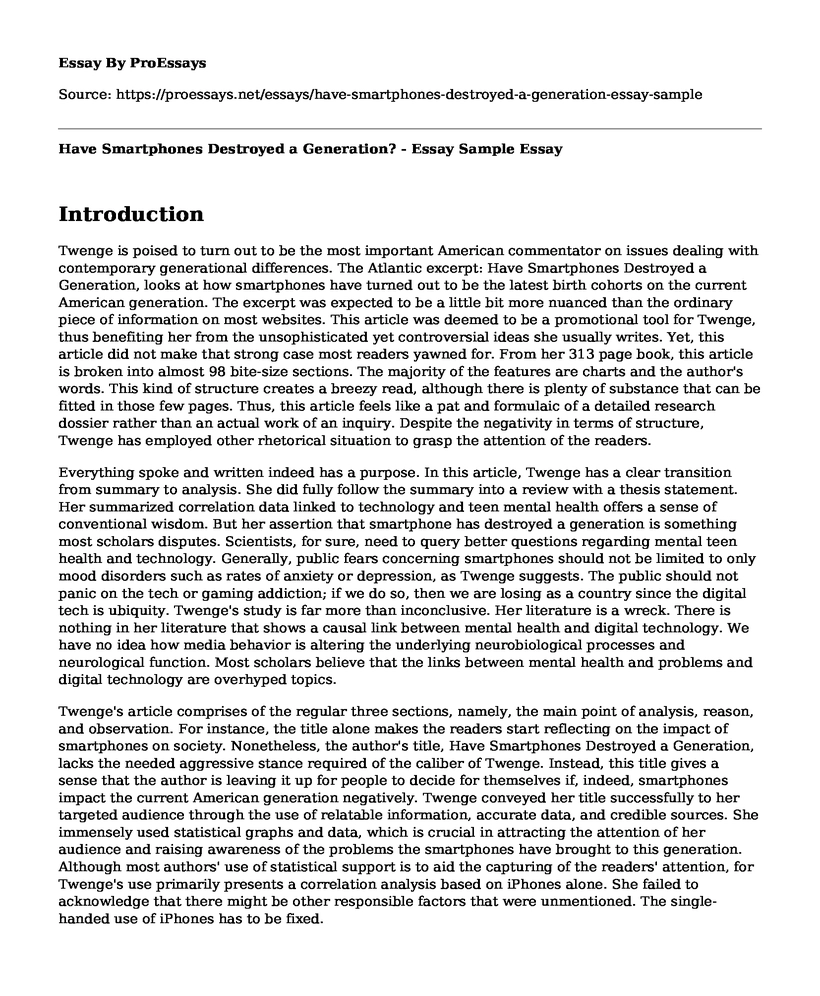Introduction
Twenge is poised to turn out to be the most important American commentator on issues dealing with contemporary generational differences. The Atlantic excerpt: Have Smartphones Destroyed a Generation, looks at how smartphones have turned out to be the latest birth cohorts on the current American generation. The excerpt was expected to be a little bit more nuanced than the ordinary piece of information on most websites. This article was deemed to be a promotional tool for Twenge, thus benefiting her from the unsophisticated yet controversial ideas she usually writes. Yet, this article did not make that strong case most readers yawned for. From her 313 page book, this article is broken into almost 98 bite-size sections. The majority of the features are charts and the author's words. This kind of structure creates a breezy read, although there is plenty of substance that can be fitted in those few pages. Thus, this article feels like a pat and formulaic of a detailed research dossier rather than an actual work of an inquiry. Despite the negativity in terms of structure, Twenge has employed other rhetorical situation to grasp the attention of the readers.
Everything spoke and written indeed has a purpose. In this article, Twenge has a clear transition from summary to analysis. She did fully follow the summary into a review with a thesis statement. Her summarized correlation data linked to technology and teen mental health offers a sense of conventional wisdom. But her assertion that smartphone has destroyed a generation is something most scholars disputes. Scientists, for sure, need to query better questions regarding mental teen health and technology. Generally, public fears concerning smartphones should not be limited to only mood disorders such as rates of anxiety or depression, as Twenge suggests. The public should not panic on the tech or gaming addiction; if we do so, then we are losing as a country since the digital tech is ubiquity. Twenge's study is far more than inconclusive. Her literature is a wreck. There is nothing in her literature that shows a causal link between mental health and digital technology. We have no idea how media behavior is altering the underlying neurobiological processes and neurological function. Most scholars believe that the links between mental health and problems and digital technology are overhyped topics.
Twenge's article comprises of the regular three sections, namely, the main point of analysis, reason, and observation. For instance, the title alone makes the readers start reflecting on the impact of smartphones on society. Nonetheless, the author's title, Have Smartphones Destroyed a Generation, lacks the needed aggressive stance required of the caliber of Twenge. Instead, this title gives a sense that the author is leaving it up for people to decide for themselves if, indeed, smartphones impact the current American generation negatively. Twenge conveyed her title successfully to her targeted audience through the use of relatable information, accurate data, and credible sources. She immensely used statistical graphs and data, which is crucial in attracting the attention of her audience and raising awareness of the problems the smartphones have brought to this generation. Although most authors' use of statistical support is to aid the capturing of the readers' attention, for Twenge's use primarily presents a correlation analysis based on iPhones alone. She failed to acknowledge that there might be other responsible factors that were unmentioned. The single-handed use of iPhones has to be fixed.
Conclusion
All in all, the findings of this article, Have Smartphones Destroyed a Generation does not reflect a fair analysis based on the data Twenge used. The causal data employed in this article have no definitive proof of how minds are being altered for worse by digital technology. Twenge is full of humor and reason. She was very effective in this article as she got her message across the world efficiently with her choice of intelligent material.
Reference
Twenge, J. M. (2017). Have smartphones destroyed a generation?. The Atlantic, 3.
Cite this page
Have Smartphones Destroyed a Generation? - Essay Sample. (2023, Mar 12). Retrieved from https://proessays.net/essays/have-smartphones-destroyed-a-generation-essay-sample
If you are the original author of this essay and no longer wish to have it published on the ProEssays website, please click below to request its removal:
- Introduction to Innovation
- Paper Example on Grid Attack in America
- Should Children Carry Cell Phones To School? - Essay Sample
- Detriments of Nuclear Energy in Light of the Fukushima Disaster Essay
- Use of Smartphones on Patient Care and Information From the Database
- Essay Example on Innovations in Nursing Curriculum for Enhanced Knowledge Acquisition
- Research Paper Example on Innovate & Entrepreneur: The Keys To Success In A Competitive Market







